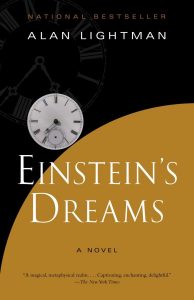What if?
There is hardly a more revolutionary question. All human accomplishment rises from this two-syllable query, both beneficial and malevolent. The seeds of tools, language, art, philosophy, and science always sprout from an imagining of possibility.

In this context, think of young Albert Einstein, on the verge of publishing his famous formula, his mind churning with dreams about “the many possible natures of time.” What if, he wonders, that unlike our familiar concept of linear time, there are worlds in which “time is a circle, bending back on itself,” or where people live just one day or, the opposite, live forever? What would life be like in such worlds?
In “Einstein’s Dreams,” physicist and novelist Alan Lightman answers that question with short, fantastical scenarios that presume how other versions of time would shape human behavior. In one imagined world, for example, where time advances more slowly at higher altitudes, the wealthy occupy the most vertiginous terrain in order to live longer. In another world, one without future, “each laugh is the last laugh” and “beyond the present lies nothingness (so) people cling to the present as if hanging from a cliff.”
In each tableau, people do what they always do: some conform to the demands of time out of greed or fear or simple acquiescence, others choose their own paths, occupying eddies of tranquility amid the surging river of time. These choices offer meditative lessons for your consideration.
Lest “Einstein’s Dreams,” seem too wonky, I assure you it is not. Lightman writes in spare, entertaining language whose rhythmic nature at times flirts with poetry. It is highly descriptive and fun to read.
